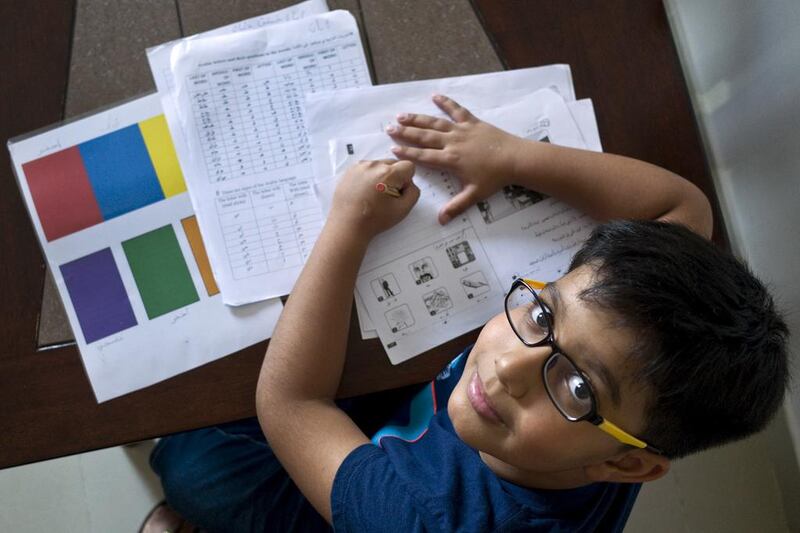DUBAI // Expatriate parents are calling for improved methods of teaching Arabic in private schools as their children struggle to learn and speak the language properly despite hours devoted to classes each week.
Indian Farrukh Naeem, a digital communication specialist, said his six-year-old daughter, who is in Grade 2, gets good marks in Arabic but is still unable to speak fluently. “She can read Arabic fluently and can recite Arabic verses from the holy Quran but she is reluctant to speak,” Mr Naeem said.
“Because English is the bridge language for 100-plus nationalities in the UAE, there isn’t a pressing need to learn Arabic, as most expats already know a second language that works in most circumstances.”
Mr Naeem said it was not necessarily the fault of the teachers or parents that children do not speak Arabic.
“If children get great marks in the compulsory language but are unable to speak the language, it can also mean that the syllabus and teaching methodology needs to be evolved,” he said. “Maybe instead of bigger, heavier and more expensive books, it would be better to make easier, friendlier, more intuitive lessons and learning opportunities.”
Ayaan Arshad Khan, 9, who is in Grade 4 at a British school in Abu Dhabi, said that teachers focused only on writing.
“Our teachers provide us with notes which we copy and memorise for the exams,” Ayaan said.
His mother, Sanobar Sabah, said it was unfortunate that, despite living in an Arab country, they had not been able to learn the language properly.
She said schools usually had a different syllabus for Arabs and non-native Arabic speakers.
“Even if that is the case, at least have one interactive class a week between the two groups – it would help dramatically.
“Kids will learn from each other,” said the 35-year-old, who was brought up in the UAE but never learnt to speak Arabic.
Ms Sabah decided to get some extra Arabic classes for her son.
“I noticed Ayaan picked it up better with a once-a-week, one-hour session with an Arabic instructor,” she said. “This means there’s definitely something the schools can work on.”
Arabic teacher Souhir Majid endorses the idea of increased interaction between native and non-native Arabic speakers.
“I saw the results of this with the children of friends who sent their non-native children to Arabic medium schools and also with my friends who were learning Arabic and practised with me regularly,” she said.
A lack of desire from expat children to learn and speak Arabic is a hindrance, Ms Majid said.
“English is pretty much the first language spoken in the country, even if it is not official,” said the 31-year-old British teacher.
“There also seems to be a perception that Arabic is a difficult language to learn, which creates barriers before learning takes place.”
Dubai’s education regulator, the Knowledge and Human Development Authority, said that improvements had been made in the quality of Arabic teaching and the progress of pupils in the past eight years.
“The quality of teaching and learning of Arabic as an additional language in Dubai private schools remains a priority for KHDA,” a spokesman said.
“School leaders ensure teachers are well qualified and teachers make learning relevant for the pupils and provide opportunities for them to use Arabic at school and out of school.”
Gems Education said its schools were committed to encouraging pupils to use Arabic across their day-to-day activities in school.
“In an effort to improve the quality of Arabic classroom instruction and student learning, we have formulated an integrated approach with a range of projects and programmes experiences for students to practise Arabic,” a spokeswoman said.
akhaishgi@thenational.ae






